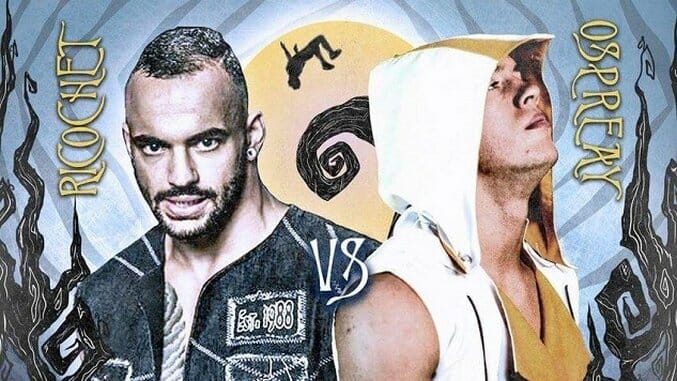Introducing Endless Mode: A New Games & Anime Site from Paste
Some people don’t like beautiful things. That thought ran through my head about a third of the way through the match that Ricochet and Will Ospreay had at Over the Top Wrestling’s The Dream Before Christmas show, which premiered on Floslam last night. Their third singles match of the year, it was another GIF-worthy clinic in state-of-the-art high-flying wrestling, and their best encounter yet.
The obvious response to that thought, of course, is that beauty is in the eye of the beholder. Just because I might find a highly acrobatic and choreographed exhibition to be an exhilarating example of modern pro wrestling at its finest, doesn’t mean a fan more concerned with selling and psychology and traditional mat wrestling would agree. If you prefer hard-hitting ground-based work that more closely resembles something akin to a real fight (a style of wrestling I am also a big fan of), then I understand why the convoluted machinations of the Ricochets and Ospreays of the world wouldn’t scratch your wrestling itch.
If you’re familiar with the wrestling discourse, though, you know that there’s a strain of fan who doesn’t just dislike what they condescendingly call “flippy shit,” but grow apoplectic at the very thought of it. To those self-styled “old school” hardliners, what Ricochet, Ospreay, the Young Bucks and other high flyers do isn’t “real” wrestling. It’s gymnastics. It’s choreography. It’s a dance between two willing partners, and not a fight.
They’re correct on all fronts. What they seem to forget, though, is that pro wrestling itself is almost never a fight. Unless something goes horribly wrong between those ropes, all wrestling is choreography. All wrestling is a dance between two willing partners. I sympathize with the insistence that pro wrestling, something that is patently cartoonish, shouldn’t become too cartoonish—that way lies the worst impulses of Vince McMahon—but to continue to harp on that point during a match as athletically spellbinding as the one I watched last night is simply poor judgement.
One aspect of this argument is that some fans are distracted by these gymnastics. That the sight of a man spinning and twirling through the air somehow blinds us to the fact that they’re not selling “properly” or following basic tenets of psychology. Those critics should consider watching a match like last night’s more closely, keeping an eye out for the anguish on both men’s faces as they sell the effects of their brutal maneuvers, and the pain and desperation that flashes across them as they dig down deep and reel off another hail Mary move in the hopes of pulling out the victory. Those critics should ask themselves if they’re the ones too distracted by the so-called “flippy shit” to truly see the match happening in front of them.
Ospreay and Ricochet might always prefer two rotations where one would suffice. They might kick out of too many theoretically devastating moves, in the finest indie wrestling tradition. They might even resemble a videogame at times. But at no point in any of their three matches this year were they ever boring. At no point did they ever lose the crowd or drive the fans watching at home to glance at their phones. To say that a match that captures and sustains fan interest as thoroughly as these three have is somehow not “real” wrestling is to misunderstand what wrestling is.
I am no stranger to traditional pro wrestling. I grew up watching the NWA on TBS in the 1980s, and it’s those shows and matches that created the enduring love I have always felt for wrestling ever since. When booked well, and with the right performers, that style of pro wrestling is still the best the medium gets, inside and outside of the ring. But I kept watching after Crockett sold to Ted Turner. I saw Jushin Liger and Brian Pillman tear down the house on TV and in the Omni in 1992. I saw Eddie Guerrero, Rey Misterio, Dean Malenko and a gaggle of luchadors revolutionize the business on Nitro every week for years. To not see how Ricochet and Will Ospreay are the rightful heirs to that legacy, and a legitimately valuable part of the industry today, makes those critics look not just out of touch with contemporary wrestling, but forgetful of its history.
Garrett Martin edits Paste
’s games, comedy and wrestling sections. He’s on Twitter @grmartin.